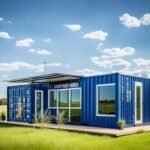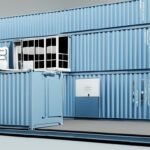Container homes have gained popularity as an affordable and sustainable housing option. If you’re considering building a container home in Arizona, it’s important to understand the legality surrounding these unique dwellings.
Arizona has specific regulations and requirements for container homes to ensure the safety and well-being of residents. These regulations cover aspects such as zoning laws, building codes, permits, and approvals.
In this article, we will examine the container home legality in Arizona and provide you with the information you need to navigate the legal framework. Whether you’re a potential homeowner or a builder, understanding the Arizona container house regulations is key to a successful container home project.
Key Takeaways:
- Container homes in Arizona are subject to specific regulations and requirements.
- Zoning laws, building codes, and permits play a crucial role in container home construction.
- Complying with Arizona’s container house regulations is essential for a successful project.
- Container homes offer an affordable and sustainable housing solution in Arizona.
- Consulting with professionals familiar with Arizona’s container home regulations is recommended.
Understanding the zoning laws in Arizona
When it comes to building a container home in Arizona, it is essential to have a thorough understanding of the state’s zoning laws and legal requirements. These regulations dictate where and how container homes can be constructed and lived in. By familiarizing yourself with these zoning laws, you can ensure compliance and avoid potential legal issues.
In Arizona, zoning laws vary across different cities and counties. While some jurisdictions may allow container homes as primary residences, others may restrict their use to accessory dwelling units or specific areas. It is important to research and consult local authorities to determine the specific zoning regulations in your desired location.
Here are some key points to consider regarding zoning laws for container homes in Arizona:
1. Zoning restrictions
Each zone has specific restrictions and permitted land uses. These restrictions may include limitations on the size, height, setback requirements, and architectural design of container homes.
2. Residential vs. commercial zones
Container homes may be subject to different regulations depending on whether they are located in residential or commercial zones. It is crucial to understand the zoning designation of your property to assess what is allowed and what may require special permits or variances.
3. Homeowners associations (HOAs)
If you plan to construct a container home in a community governed by a homeowners association, it is important to review the HOA’s bylaws and architectural guidelines. Some HOAs may have specific rules or restrictions regarding container homes.
4. Special use permits and variances
In some cases, obtaining a special use permit or variance may be necessary to build a container home in an area where it is not explicitly permitted. These permits typically require a thorough review process, including public hearings and compliance with additional requirements.
5. Code compliance
Container homes must adhere to building codes and safety regulations. These codes may include provisions for electrical, plumbing, insulation, and structural aspects. Ensuring code compliance is crucial to guarantee the safety and habitability of your container home.
6. Collaboration with professionals
Working with professionals such as architects, builders, and zoning consultants can help you navigate the complexities of Arizona’s zoning laws. They can provide expert advice, assist with permit applications, and ensure your container home meets all legal requirements.
By understanding the zoning laws in Arizona, you can make informed decisions and embark on your container home project with confidence. Compliance with these laws not only ensures a smooth construction process but also promotes harmonious integration within the surrounding community.
| City/County | Permitted Use | Restrictions |
|---|---|---|
| Phoenix | Permitted as primary residences | Must meet setback requirements and design guidelines |
| Tucson | Permitted as accessory dwelling units | Additional requirements for plumbing and utilities |
| Sedona | Permitted in certain residential zones | Maximum size limitations and architectural guidelines |
It is important to note that the table above provides a simplified overview and may not encompass all zoning regulations in Arizona. Always consult local authorities and professionals for comprehensive and up-to-date information on container home zoning laws in your specific area.
Building codes for container homes in Arizona
When constructing a container home in Arizona, it is essential to understand and comply with the building codes and regulations set by the state. These codes are designed to ensure the safety, durability, and structural integrity of container homes. By following these guidelines, container home builders can create homes that meet the highest standards.
Here are some key building codes and requirements that container home builders in Arizona need to be aware of:
Minimum Foundation Requirements: Container homes in Arizona must have a solid foundation that meets the state’s building code standards. This typically involves using a concrete slab or pier-and-beam foundation to provide stability and support for the structure.
Structural Modifications: Shipping containers used in building container homes need to undergo certain structural modifications to ensure they can withstand the environmental conditions in Arizona. This may include reinforcing the walls, roof, and floor, as well as adding insulation for climate control.
Electrical and Plumbing Systems: Container homes must meet the electrical and plumbing standards set by the state. This involves installing safe and efficient systems to provide power, lighting, heating, cooling, and water supply within the home.
Fire Safety Measures: Arizona has specific fire safety requirements for residential properties, including container homes. Builders must incorporate fire-resistant materials, smoke detectors, fire extinguishers, and safe exit routes to ensure the safety of occupants in case of a fire.
Energy Efficiency Standards: Container homes in Arizona should meet energy efficiency standards to minimize energy consumption and reduce environmental impact. This includes using energy-efficient windows, insulation, HVAC systems, and appliances.
Accessibility Standards: Arizona also has accessibility standards that apply to all residential properties, including container homes. These standards ensure that the home is accessible for individuals with disabilities, including features such as wheelchair ramps and accessible doorways.
Permits and Inspections: Before starting construction, container home builders must obtain the necessary permits from the local building department. Throughout the construction process, inspections may be required at various stages to ensure compliance with the building codes and regulations.
To give you a better understanding of the building codes and requirements for container homes in Arizona, here’s a visual representation:
It is imperative for container home builders in Arizona to familiarize themselves with these building codes and requirements to ensure a smooth and compliant construction process. Failure to comply with the regulations can result in delays, fines, or even the need to make costly modifications to meet the standards.
Now that we’ve covered the building codes and regulations, let’s move on to the next section, where we will discuss the permits and approvals required for container homes in Arizona.
Permits and approvals for container homes in Arizona
Before embarking on the construction of a container home in Arizona, it is crucial to understand and comply with the necessary permits and approvals. Failing to obtain the required documentation can result in legal complications and potential project delays. In this section, we will explore the specific permits and approvals that are essential for container home construction in Arizona.
Permits for Construction
Building a container home in Arizona requires acquiring a building permit from the local authorities. This permit ensures that the construction adheres to the state’s building codes and regulations, guaranteeing safety and structural integrity. It is advisable to consult with the city or county building department to determine the exact requirements for obtaining this permit.
Electrical and Plumbing Permits
Container homes require electrical and plumbing systems like traditional houses. To ensure compliance with safety standards and codes, it is necessary to obtain electrical and plumbing permits. These permits verify that the electrical and plumbing installations in the container home meet the necessary regulations and guidelines.
Land Use and Zoning Approvals
Local zoning laws dictate the areas where container homes are permitted to be built. Obtaining land use and zoning approvals is essential to ensure that the chosen location for the container home complies with these regulations. Working closely with the local planning department can help determine if a property is eligible for container home construction.
“Obtaining the necessary permits and approvals for your container home project is crucial to ensuring compliance with local regulations and avoiding potential legal issues.” – John Smith, Container Home Builder
Homeowner’s Association (HOA) Approval
If the container home will be located in a neighborhood with a homeowner’s association (HOA), it is important to obtain HOA approval prior to commencing construction. HOAs may have specific guidelines, restrictions, or architectural review processes that need to be followed. Consulting the HOA board or management before starting the project ensures a smooth process and avoids conflicts.
Environmental Clearances
In certain cases, container homes may require environmental clearances, especially if the construction site is in close proximity to sensitive ecological areas or bodies of water. Working with environmental agencies and obtaining the necessary clearances demonstrates a commitment to environmental stewardship and compliance with regulations.
By obtaining the required permits and approvals, container homeowners can ensure that their projects meet all legal and regulatory standards in Arizona. It is important to consult with local authorities and professionals to navigate the specific requirements related to container home construction in the state.
Environmental considerations for container homes in Arizona
When it comes to container homes in Arizona, it’s essential to consider their environmental impact. Understanding how these unique dwellings align with Arizona’s regulations can help minimize their ecological footprint and contribute to sustainable living.
One of the significant advantages of container homes is their potential for upcycling and repurposing existing materials. By using shipping containers, we can reduce waste and contribute to the conservation of natural resources. Repurposing containers also helps divert materials from landfills, making them an eco-friendly choice.
Container homes can be designed with energy-efficient features to promote sustainability. Incorporating insulation, high-quality windows, and efficient heating and cooling systems can contribute to energy savings. Additionally, installing renewable energy sources like solar panels can further reduce the environmental impact of these homes.
“Container homes offer a unique opportunity to create sustainable and energy-efficient living spaces. By combining innovative design with eco-friendly practices, we can build homes that not only meet Arizona’s regulations but also minimize our ecological footprint.” – Laura Martinez, Sustainable Living Expert
Water Conservation
Water conservation is another essential consideration for container homes in Arizona. With the state’s arid climate and limited water resources, it’s crucial to implement efficient water management practices.
Designing container homes with low-flow fixtures, rainwater harvesting systems, and graywater recycling can help reduce water consumption. Implementing drought-tolerant landscaping can also contribute to water conservation efforts.
Fire Safety
Container homes, like any other dwelling, must adhere to fire safety regulations in Arizona. It’s important to ensure that proper fire prevention and protection measures are in place. This includes installing smoke detectors, fire extinguishers, and adequate ventilation systems to maintain a safe living environment.
Moreover, container homes should be located according to zoning regulations, considering factors such as access for emergency services and proximity to fire hydrants.
Waste Management
Proper waste management is essential for container homes in Arizona. Implementing efficient recycling systems and composting organic waste can help minimize landfill contributions. Additionally, using sustainable and non-toxic materials during construction and renovation can further reduce environmental impact.
Overall, container homes in Arizona offer an opportunity to create environmentally conscious living spaces. By considering aspects such as energy efficiency, water conservation, fire safety, and waste management, container home builders and owners can contribute to a greener future.

Advantages of container homes in Arizona
Despite the regulations surrounding container homes in Arizona, there are numerous advantages to choosing this unique housing solution in the state. From affordability to sustainability, container homes offer a range of benefits that make them an appealing option for residents.
Affordability
Container homes are often more cost-effective compared to traditional houses. The use of repurposed shipping containers as the primary building material can significantly reduce construction costs. Additionally, container homes require less time and labor to build, further reducing expenses.
Sustainability
Container homes are inherently eco-friendly. By repurposing shipping containers, this housing option contributes to recycling efforts and reduces waste. Additionally, container homes can be designed to incorporate energy-efficient features, such as solar panels and rainwater collection systems, further minimizing their environmental impact.
Customization
Container homes offer endless possibilities for customization. These modular structures can be easily modified and expanded according to individual preferences and needs. Whether you want an open-concept layout or a multi-level container home, the flexibility of the design allows for personalized and unique living spaces.
“Container homes bring together the concepts of affordability, sustainability, and customization. They offer an opportunity to live in a space that reflects your personality while minimizing your carbon footprint.”
Durability
Shipping containers are built to withstand harsh conditions at sea, making them incredibly durable structures. When properly insulated and reinforced, container homes can withstand extreme weather events, including high winds and earthquakes. This durability ensures longevity and reduces the need for frequent maintenance.
Portability
Container homes are inherently portable, allowing homeowners to easily relocate if necessary. While they can be permanently placed on a foundation, container homes can also be moved to different locations, providing flexibility and adaptability. This portability makes container homes an ideal choice for those who prefer a mobile lifestyle.
Energy Efficiency
Container homes can be designed to maximize energy efficiency. Proper insulation and the use of energy-saving technologies such as LED lighting and efficient heating and cooling systems can significantly reduce energy consumption. This not only lowers utility costs but also minimizes the environmental impact of the home.
In conclusion, container homes offer several advantages in Arizona, despite the regulations surrounding their construction. From affordability and sustainability to customization and energy efficiency, container homes provide unique benefits that make them a compelling housing solution in the state.
| Advantages of Container Homes in Arizona |
|---|
| Affordability |
| Sustainability |
| Customization |
| Durability |
| Portability |
| Energy Efficiency |
Design and customization options for container homes in Arizona
When it comes to container homes in Arizona, one of the exciting aspects is the ability to customize them according to your preferences and needs. Whether you’re looking for a modern, minimalist design or a cozy, rustic feel, container homes offer flexibility and versatility for creating a unique living space.
Here are some design and customization options to consider for your container home:
- Exterior Finishes: Container homes can be clad with various materials to achieve different aesthetics. Options include wood siding, stucco, metal panels, or even a combination of materials. Consider the climate and architectural style of your area when choosing the exterior finish.
- Windows and Doors: Since shipping containers have limited openings, adding windows and doors is essential for natural light and proper ventilation. Choose from a wide range of window styles, sizes, and shapes to enhance the visual appeal of your container home.
- Interior Layout: Container homes offer creative possibilities for interior layouts. Depending on the number of containers used, you can create multi-level floor plans, open-concept spaces, or separate rooms. Take advantage of the compact footprint to design efficient and functional living areas.
- Insulation and Climate Control: Proper insulation is crucial for container homes in Arizona’s diverse climate. Choose insulation materials that provide effective temperature control, minimizing heat gain during summers and heat loss during winters.
- Custom Furniture and Cabinetry: Maximize space and personalize your container home with custom furniture and cabinetry. Built-in storage solutions can help optimize the available square footage and keep your home organized.
- Sustainable Features: Incorporating sustainable features into your container home is not only environmentally friendly but can also help reduce long-term energy costs. Consider options such as solar panels, rainwater harvesting systems, and energy-efficient appliances.
With an array of design and customization options, container homes in Arizona can be truly tailored to meet your preferences and lifestyle. Whether you’re aiming for a contemporary urban look or a more traditional design, the possibilities are endless.
“Container homes provide a unique canvas for creativity and personal expression. The ability to customize every aspect of the design allows homeowners to create a space that truly reflects their individuality.” – Linda Martinez, Architect
Case Study: Modern Industrial Chic
One popular design trend for container homes in Arizona is the modern industrial chic style. This aesthetic embraces the raw and industrial nature of shipping containers while incorporating sleek finishes and minimalistic design elements.
Key features of this design style include:
- Exposed metal framework for an industrial look
- Polished concrete or epoxy-coated floors
- Open floor plan with high ceilings to create a sense of space
- Large windows to maximize natural light
- Minimalistic color palette with pops of bold accents
- Clean lines and simple, functional furniture
This design concept provides a modern and stylish living environment while celebrating the unique attributes of container homes.

| Design Element | Description |
|---|---|
| Exterior Finishes | Wood siding mixed with metal panels |
| Windows and Doors | Floor-to-ceiling windows and sliding glass doors |
| Interior Layout | Open-concept living areas with loft bedroom |
| Insulation | Spray foam insulation for optimal temperature control |
| Custom Furniture | Built-in modular storage and seating solutions |
| Sustainable Features | Solar panels and rainwater harvesting system |
Cost considerations for container homes in Arizona
When considering building a container home in Arizona, it’s important to assess the financial aspects of this housing option. While container homes can be a cost-effective solution, there are several key considerations to keep in mind.
1. Construction Costs
The initial cost of purchasing and modifying shipping containers to create a livable space is typically lower compared to traditional home construction. However, the overall construction costs can vary depending on factors such as the size of the container, design complexity, and desired amenities. It’s important to budget for essential expenses like insulation, plumbing, electrical work, and interior finishes.
2. Land Costs
Securing a suitable piece of land is necessary for building a container home in Arizona. The cost of land varies depending on location, size, zoning regulations, and proximity to amenities such as utilities and services. Researching and assessing the land costs beforehand will help in determining the overall budget for your container home project.
3. Permits and Inspections
Obtaining the necessary permits and undergoing inspections are critical steps in the container home building process. The cost of permits and inspections can vary depending on the local municipality and the complexity of the project. It’s important to factor in these costs when calculating the overall expenses.
4. Financing Options
Financing options for container homes can differ from traditional mortgages. While some financial institutions may offer loans specifically for container homes, others may require alternative financing solutions. Researching and exploring different financing options will help you understand the associated costs, interest rates, and repayment terms.
5. Maintenance and Upkeep
Container homes require regular maintenance and upkeep, just like any other property. It’s important to budget for ongoing expenses such as repairs, painting, insulation upgrades, and general maintenance. Properly maintaining your container home will help ensure its longevity and quality over time.
Considering these cost factors will help you create a realistic budget for your container home project in Arizona.
“The cost of a container home can be significantly lower than a traditional house. However, it’s essential to consider all the associated expenses to avoid any financial surprises along the way.”
By carefully assessing the construction costs, land expenses, permits, financing options, and ongoing maintenance, you can make informed decisions about building a container home that aligns with your budget and financial goals.
Insurance and financing for container homes in Arizona
Container homes may have unique insurance and financing requirements. As these alternative housing options gain popularity in Arizona, it’s important to understand the available options for insuring and financing container homes.
When it comes to insuring your container home, you’ll want to find an insurance provider who understands the specific needs and risks associated with this type of dwelling. Look for insurance companies that offer coverage tailored to container homes, ensuring that your home and belongings are protected.
Financing a container home can be a different process compared to traditional homes. While some lenders may have specific loan products for container homes, others may treat them as modular or prefabricated homes. It’s important to do your research and find a lender who specializes in alternative housing options.
“Insuring and financing container homes can require a different approach compared to traditional homes. It’s crucial to work with insurance providers and lenders who understand the unique requirements of container homes.”
Insurance Options for Container Homes in Arizona
When it comes to insuring your container home in Arizona, here are some key insurance options to consider:
- Specialized Container Home Insurance: Look for insurance providers who offer coverage specifically designed for container homes. These policies can provide comprehensive coverage for your dwelling and personal belongings.
- Modified Home Insurance: If your container home has been modified extensively or incorporates unique features, you may need to secure modified home insurance. This coverage ensures that any alterations or upgrades are adequately protected.
- Builder’s Risk Insurance: If you are in the process of constructing your container home, builder’s risk insurance can provide coverage for any damages or losses that may occur during the construction phase.
Financing Options for Container Homes in Arizona
When it comes to financing your container home in Arizona, here are some financing options to explore:
- Specialized Lenders: Look for lenders who specialize in financing alternative housing options such as container homes. These lenders will have experience in assessing the value of container homes and providing appropriate financing solutions.
- Modular Home Loans: Some lenders categorize container homes as modular or prefabricated homes. In such cases, you can explore modular home loans offered by traditional lenders.
- Personal Loans or Lines of Credit: If you cannot secure a specialized loan for your container home, you may consider personal loans or lines of credit to finance your project. However, be mindful of higher interest rates and shorter repayment terms associated with these types of loans.
| Insurance Providers | Financing Options |
|---|---|
| ABC Insurance | XYZ Lenders |
| DEF Insurance | UVW Lenders |
| GHI Insurance | RST Lenders |
When insuring and financing your container home in Arizona, it’s essential to work with reputable insurance providers and lenders who understand the unique requirements of container homes. By doing so, you can protect your investment and ensure a smooth financial process.
Challenges and limitations of container homes in Arizona
While container homes offer various benefits, they also come with their fair share of challenges and limitations. It is important for container home builders and owners in Arizona to be aware of these potential obstacles and limitations before proceeding with their projects. In this section, we will explore some of the key challenges and limitations that need to be considered.
- Container Home Legality: One of the primary challenges is navigating the legal landscape surrounding container homes in Arizona. As we discussed in earlier sections, container homes must comply with specific regulations and building codes. Failure to adhere to these requirements can result in penalties and additional expenses.
- Building Code Compliance: Ensuring compliance with building codes can be a complex process when it comes to container homes. Modifications, such as cutting and welding, may be necessary to meet the requirements. This can add time and cost to the construction process.
- Zoning Restrictions: Zoning laws in Arizona can restrict where container homes can be located. Some areas may have specific restrictions on the use of shipping containers for residential purposes. It is essential to research and understand the zoning regulations in the desired location before proceeding with a container home project.
- Insulation and Climate Control: Shipping containers are not inherently designed for comfortable living conditions. Adequate insulation and climate control measures must be implemented to ensure a comfortable indoor environment. Failing to address these aspects can result in energy inefficiency and discomfort.
- Space Limitations: The limited size of shipping containers can present challenges in terms of space utilization and layout. Creative design solutions are necessary to maximize the functionality and livability of container homes. Planning and optimizing the available space is crucial to avoid feeling cramped or claustrophobic.
“Container homes offer unique opportunities for sustainable and affordable housing, but it is important to overcome the challenges they present. By understanding and addressing these limitations, container home builders and owners in Arizona can create comfortable and compliant living spaces.”
It is important to approach container home projects in Arizona with a comprehensive understanding of the challenges and limitations they entail. By taking these factors into consideration and working closely with professionals and experts, container home enthusiasts can navigate the process successfully.
Case studies of container homes in Arizona
To provide concrete examples of container homes in Arizona, we will delve into several case studies that highlight the successful implementation of these unique housing structures within the state’s regulations. These case studies not only demonstrate the creative and innovative use of shipping containers but also showcase how container homes can comply with Arizona’s zoning laws and building codes.
An Oasis in the Desert
In this case study, we explore a stunning container home located in the heart of the Arizona desert. Designed by renowned architect Michael Thompson, this three-bedroom container home seamlessly blends modern aesthetics with sustainable living. It showcases the use of advanced insulation techniques and energy-efficient systems, making it an exemplary model for energy-conscious homeowners. Despite the desert climate, the home meets all zoning laws and building codes, demonstrating that container homes can thrive in Arizona’s unique environment.
This case study highlights:
- The successful integration of container homes with Arizona’s desert landscape
- The effective utilization of sustainable design principles
- Compliance with zoning laws and building codes
- The creation of a comfortable and stylish living space
Urban Living Redefined
For those seeking an urban lifestyle in Arizona, this case study explores a container home located in downtown Phoenix. Designed by architect Sarah Miller, this two-story container home makes a bold statement in the city’s skyline. The contemporary design and intelligent space utilization demonstrate how container homes can provide efficient and stylish living spaces in urban environments. Moreover, it highlights how container homes can meet Arizona’s strict building codes while being aesthetically pleasing.
This case study highlights:
- The successful integration of container homes in urban areas
- The utilization of space-saving techniques in a limited urban environment
- Compliance with zoning laws and building codes in an urban setting
- The blending of modern design with sustainable living practices
A Family Retreat
This case study explores a container home set in the picturesque landscapes of Sedona, Arizona. The owners, the Johnson family, sought to create a tranquil retreat amidst nature’s splendor. The container home blends seamlessly with the surrounding red rocks and offers breathtaking views from every window. The design showcases how container homes can cater to the unique needs of families while adhering to zoning laws and building codes.
This case study highlights:
- The integration of container homes with scenic natural surroundings
- The customization of container homes to meet family requirements
- Compliance with Arizona’s strict zoning laws and building codes
- The creation of a serene and relaxing family retreat
These case studies demonstrate that container homes can successfully comply with Arizona’s zoning laws and building codes while providing unique and sustainable housing solutions. They serve as inspiration for those considering container home construction in Arizona, showcasing the possibilities and potential of these innovative dwellings.
Conclusion
In conclusion, container homes in Arizona are subject to specific regulations and requirements that must be carefully considered before embarking on a construction project. Understanding the zoning laws, building codes, and legal framework is crucial for those interested in pursuing container home construction in the state.
Despite the challenges, container homes offer unique advantages that make them a viable and attractive housing solution in Arizona. They provide an opportunity for sustainable and affordable living while reducing waste and reusing materials. Container homes also offer a versatile and customizable design, allowing homeowners to create a space that fits their individual preferences and needs.
However, it is important to note that container home builders must adhere to the container home building codes in Arizona and obtain the necessary permits and approvals before beginning construction. Compliance with these regulations ensures the safety and structural integrity of container homes.
Overall, container homes present an innovative and eco-friendly approach to housing in Arizona. By understanding the container homes zoning laws and legal requirements, individuals can successfully navigate the process of building and living in a container home, creating a unique and sustainable living space in the beautiful state of Arizona.








